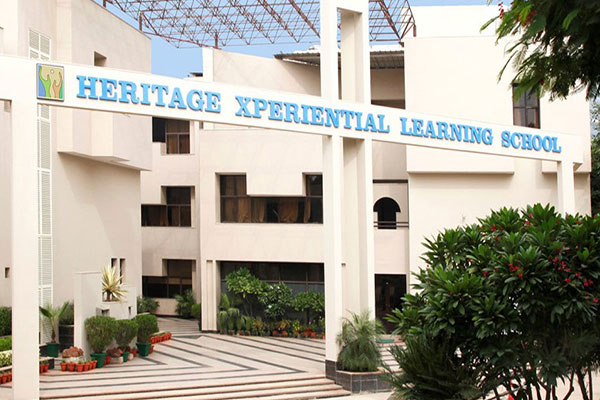Gurgaon based Heritage Xperiential Learning School has recently announced introduction of the International Primary Programme (IPP) for students from Nursery through Grade 1 for the academic session 2019-20. The programme brings together globally acclaimed instructional practices in literacy, numeracy and experiential learning to support children in becoming deep and flexible thinkers who understand diverse perspectives and develop the essential skills to thrive in a global society.
Announcing the launch of the programme, Manit Jain, cofounder, The Heritage Group of Schools said, “Our school has made significant progress in terms of providing real and meaningful learning experiences within the constraints of the national system. The launch of the international curriculum allows us even greater latitude to do multi-disciplinary work that provides richer contexts to children and teachers to immerse in deeper learning experiences.”
The philosophy of the programme is to build on the child’s natural curiousity and desire to learn through exploration and experience. Thus, the key elements are based on experiential learning expeditions which enable students’ learning to go beyond just one subject and instead integrate and link students’ learning and explorations across multiple disciplines that are connected to the real world.
Commenting about the uniqueness of the programme, Amy K. Marx, Head – International Primary Programme says, “The International Primary Programme at Heritage will be a small vibrant, nurturing and caring community that stimulates and fosters children’s natural curiosity and passion for learning through connecting all explorations to the world beyond our classroom walls. We are developing young people who will grow and learn in a diverse, global learning community from the beginning so they will naturally be comfortable as life-long positive, contributing citizens of their own local community and our world.”
Drawing on best practice research from US and UK, the International Primary Programme ensures mastery of essential skills and content. Architectured after in-depth study, the programme offers Science and Social Studies concepts and skills embedded with experiential learning expeditions, where students learn as real scientists, historians, journalists, authors, and so on. The literacy programme focuses on all students developing their reading and writing skills in a workshop format and follows a balanced literacy approach to nurture students as authors and writers of their own ideas. In math, through inquiry-based instruction, students build essential conceptual knowledge connected to real world problem-solving; regularly using manipulatives to develop deep understanding of mathematical concepts.
The International Primary Programme is associated with the Association for Experiential Education (AEE), International Primary Curriculum (IPC), and International Early Years Curriculum (IEYC). The focus on expeditionary learning continues in the International Programme in the higher grades. Grade 6 to Grade 10 is associated with the Cambridge Assessment International Education followed by the International Baccalaureate (IB) Diploma Programme (DP) in grades 11 and 12. Our programme is further enhanced with technology integration, digital literacy philosophy, and maker-centred learning. We offer rich visuals and performing arts integrated programming along with a physical education programme based on National Association for Sport and Physical Education standards (NASPE, USA).
Key features of the International Primary Programme:
● Smaller class sizes, with more individualised attention (class size of 26 with two teachers up to Grade 3): a safe and welcoming environment of listening and caring where children are provided room for free expression, thereby cultivating authenticity, inclusion and respect.
● A peaceful and nurturing setting: opportunities to explore nature/natural material and phenomenon, where children begin to form meaningful experiences upon which later scientific experiments and learning will be based.
● Modular class units that can be combined into one common learning area or vice-a-versa: experience of large-group, small-group, and solitary activities to foster relationships and learn under the tutelage of two class teachers.
● Classes with children and teachers from diverse and international backgrounds: to foster multicultural understanding and diverse perspectives.
● Daily circle, crew time: for regular discussions and community building on a range of interpersonal and social issues to establish strong relationships among students and between students and their class teachers.
● Celebration of global, multi-cultural festivals and occasions: to focus on diversity and inclusion in cultures and perspectives.
● An open door policy for interaction with families and teachers: to foster a family’s partnership in the child’s developmental journey and work in tandem as a “community of adults for our children”.
● Grade-specific community endeavours and service connected to experiential learning expeditions: to build change-makers and action-oriented young citizens.
● Curriculum aimed at striving for international excellence: through drafts, feedback, self-assessment and reflection, and clear rubrics or criteria for success which develop craftsmanship and quality in students’ work.
● Evaluation-based on continuous formative assessments: students undergo periodic benchmarking tests/ assessments, such as global benchmarking instruments (like Lexile reading level scores, etc) to monitor ongoing progress of each child and to determine appropriate individual interventions and accelerations of programming.
● Language instruction: All classroom instruction will be conducted in English and home language instruction will also be provided for students in Hindi and in any other native languages spoken by our students (e.g. Korean, Japanese, German, etc.) if more than five students are enrolled in IPP. Individual home language supports will be developed if there are less than five students who speak a particular language. ESL (English as a Second Language) support structures will be in place for any student who needs this additional scaffolding and support. Instruction in another international language (Spanish or French) is also provided from Grade 2 onwards.
● School year calendar follows international schedule from late July to early June (with Bridge Programmes for students in April/May and July)
Posted in Campus























